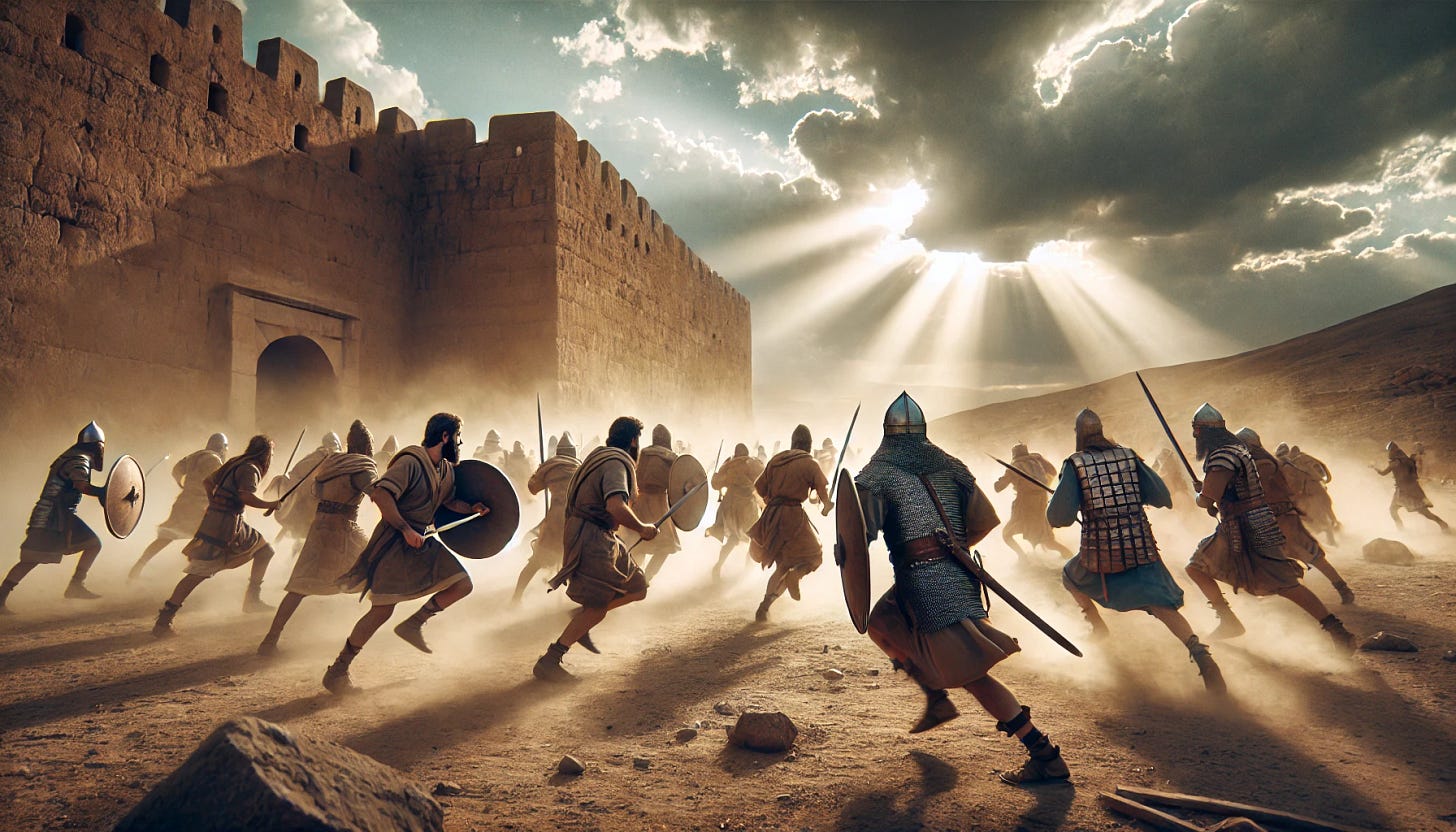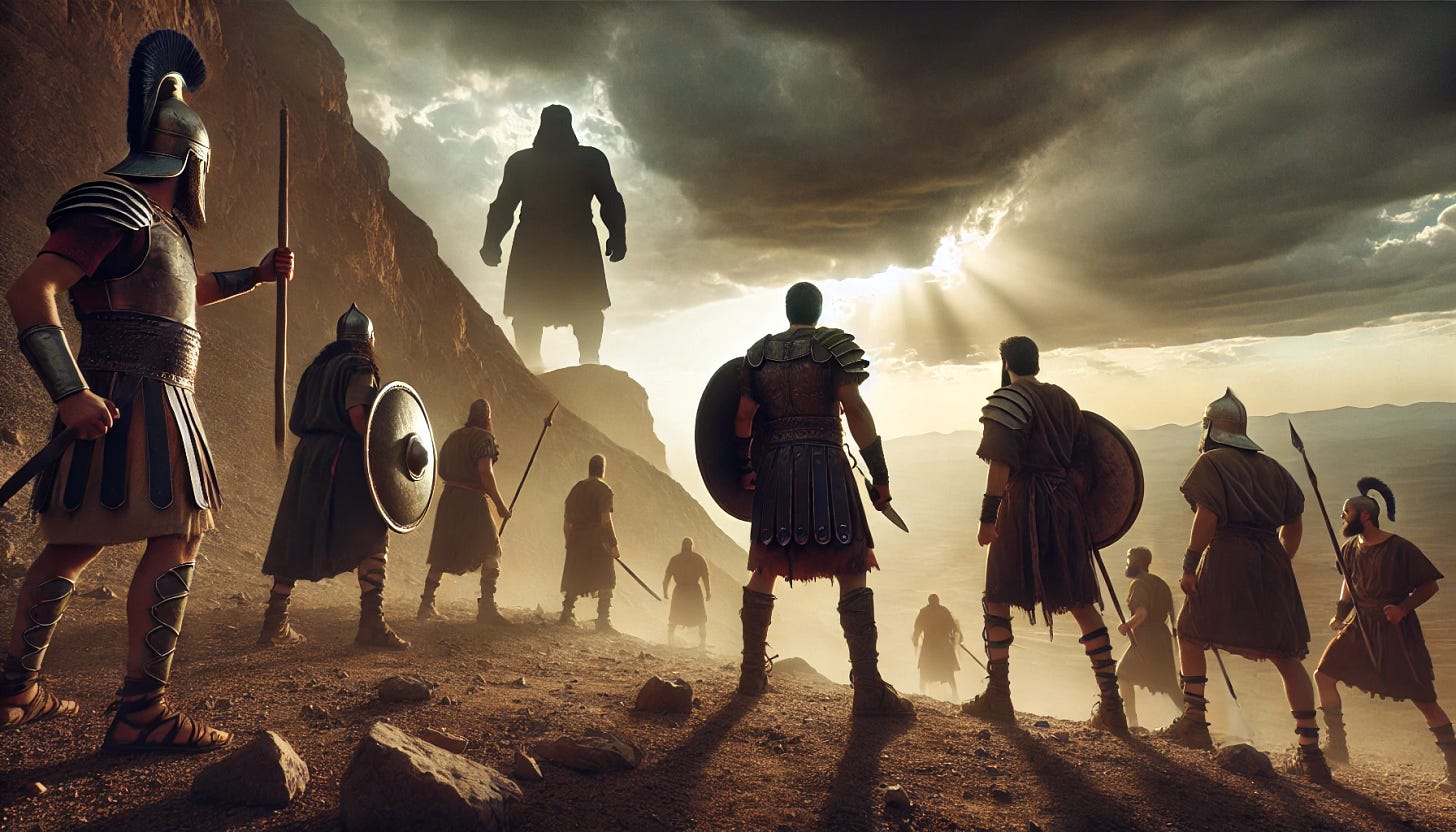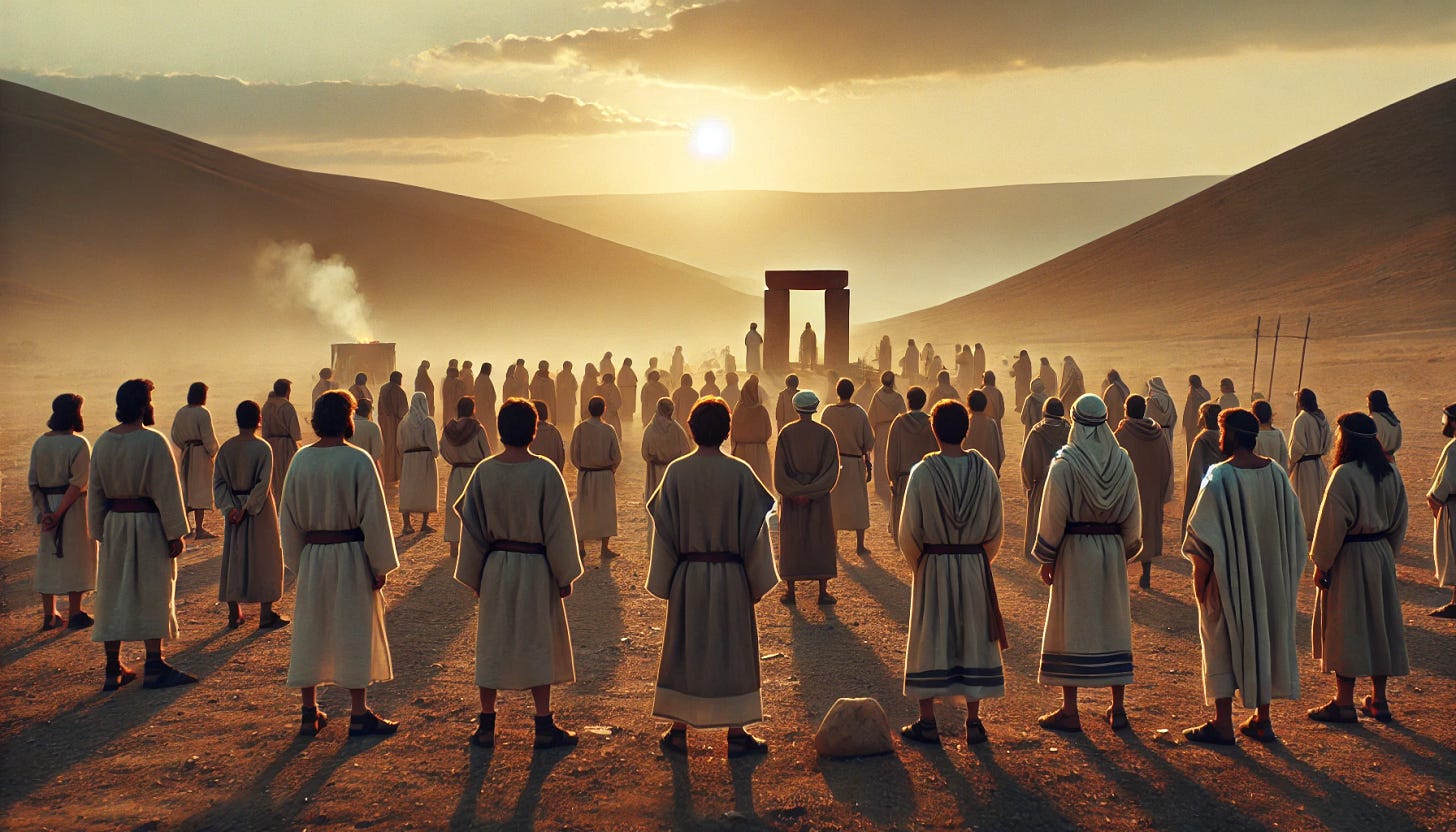Week 13: The Rephaim and the Power of God — Judgment on Corrupted Thrones
Ancient Battles, Divine Justice, and God's Sovereignty Over Spiritual Forces
Theme
The conquest of the Rephaim reveals God’s sovereign judgment on corrupted spiritual and earthly lineages. Israel’s obedience in battle affirms God's promise, as His power triumphs over the ancient enemies of His redemptive plan.
Objectives
Understand the historical and spiritual significance of Israel’s encounters with the Rephaim on the way to the Promised Land.
Explore God’s judgment on the corrupted bloodlines and rebellious rulers as part of His cleansing of the land.
Reflect on God’s faithfulness and power to fulfill His promises despite seemingly insurmountable opposition.
Scripture Focus
Main Sections
Introduction
Deuteronomy 2–3 recounts Israel’s journey through the wilderness as they approached the Promised Land. These chapters focus on their encounters with various nations and the giants among them—the Rephaim. Unlike earlier instructions to avoid conflict with certain relatives, God now commands Israel to confront and destroy the kingdoms of Sihon and Og. These events represent not only territorial conquest but spiritual warfare against corrupted rulers opposing God’s kingdom.
1. God’s Guidance in the Wilderness (Deuteronomy 2:1–23)
Israel was instructed to avoid conflict with Edom, Moab, and Ammon—nations descended from Esau and Lot. These boundaries reflected divine restraint and respect for God's broader purposes. At the same time, the text references the defeat of Rephaim by other nations, signaling God's ongoing judgment on corrupted bloodlines.
God leads with wisdom and purpose, asking Israel to honor divine boundaries. Identity in Christ involves trusting God's timing and not forcing spiritual battles prematurely. For everything there is a season, a time for every purpose under heaven as Ecclesiastes 3:1 reminds us. When we understand our position in Christ, we realize that our identity is not found in what we do but in who we are—beloved children of the living God.
The Father has always had perfect timing, even with ancient Israel. He instructed them when to move forward and when to wait, teaching them to trust His sovereignty rather than their own understanding. This profound truth extends to us today: our identity in Christ is secure regardless of our circumstances. In Romans 8:37, we learn that we are more than conquerors through Him who loved us. Yet this conquest happens according to His timetable, not ours.
God's strategic instructions display divine intelligence and justice. These movements reveal a God who is not arbitrary, but precise and sovereign in His dealings. When we examine His commands to Israel, we see evidence of divine wisdom that transcends human understanding. The conquest narratives demonstrate a profound truth: God's judgments are always righteous and purposeful.
The defense of our faith rests not on human reasoning alone, but on the character of God as revealed through His Word. In 1 Peter 3:15, believers are called to always be ready to give a defense for the hope within them. This defense becomes powerful when we recognize the strategic wisdom behind God's actions throughout redemptive history. His dealings with the nations of Canaan were not capricious but reflected His perfect justice and plan for humanity's redemption.
Israel's journey was not random; they were advancing toward a purpose—to cleanse the land and prepare it for God's kingdom. Each step was loaded with redemptive significance. This cosmic narrative extends beyond mere territorial acquisition to the establishment of God's redemptive plan for all humanity. In Ephesians 1:10, we see that God's ultimate purpose is to unite all things in Christ, things in heaven and things on earth.
The conquest of Canaan foreshadowed a greater reality—the ultimate restoration of all creation under God's rightful rule. We, as believers, participate in this cosmic redemption story. As 2 Corinthians 5:18-19 teaches, God has given us the ministry of reconciliation. Our lives matter eternally because we are participants in God's grand redemptive narrative that began with Israel and culminates in the new creation.
The references to the Rephaim tie Israel's conquest to earlier divine judgments on hybrid and rebellious beings. God was dismantling enemy strongholds both seen and unseen. This supernatural worldview is essential for understanding Scripture's full message. The biblical narrative consistently reveals that our world is the theater of cosmic conflict between divine and rebellious forces. In Ephesians 6:12, we learn that our struggle is not against flesh and blood, but against the rulers, against the authorities, against the cosmic powers over this present darkness.
The ancient Rephaim were not merely tall people but connected to the Nephilim mentioned in Genesis 6:4, representing a corruption of the created order that God had judged in the flood. Israel's conquest of these territories represented God's continued judgment against rebellious spiritual forces and their human allies. This perspective illuminates why certain battles were fought—they were divine reclamations of territory that had been usurped by entities in rebellion against heaven's authority. As Colossians 2:15 reveals, Christ ultimately disarmed these rulers and authorities, triumphing over them through the cross.
2. The Conquest of Sihon, King of Heshbon (Deuteronomy 2:24–37)
Sihon refused Israel’s peaceful request to pass through, prompting God to deliver him into Israel’s hands. His defeat marked the beginning of military conquest and the unveiling of God's justice against corrupt rulers.
Israel was learning to trust God's empowerment in battle. As we walk in our identity, God calls us to stand boldly in spiritual authority when He says, "Go." Our identity isn't something we create—it's something we discover in relationship with our Father. When Israel faced Sihon, they weren't merely fighting as soldiers; they were stepping into their divine assignment as sons and daughters. This is precisely what happens when we begin to see ourselves as God sees us—we move from fear to faith, from hesitation to holy boldness.
The Father has always intended for His children to walk in supernatural authority. Deuteronomy 3:22 reminds us, "Do not fear them, for the LORD your God Himself fights for you." This isn't just about ancient battles; it's about your life today. When you understand who you are in Christ, you begin to move with a different confidence—not self-confidence, but God-confidence. The challenges before you become opportunities for God's power to be displayed through your yielded life. Ephesians 1:19-20 speaks of this "immeasurable greatness of his power toward us who believe." We access this power not through striving but through surrender and identity.
Sihon's downfall was not luck; it was a fulfillment of divine decree. Israel's obedience affirmed God's power to act on His promises. Deuteronomy 2:36 shows the completeness of God's victory through His people. This historical account demonstrates a profound truth about the reliability of God's word. When He promises something, it will come to pass with mathematical certainty. The conquest wasn't just a military campaign; it was evidence of God's faithfulness.
We must recognize that God's promises are more certain than the ground beneath our feet. Numbers 23:19 declares, "God is not man, that he should lie, or a son of man, that he should change his mind. Has he said, and will he not do it? Or has he spoken, and will he not fulfill it?" This rational certainty gives us intellectual confidence when facing skepticism about our faith. The historical reliability of Scripture provides a solid foundation upon which we can stand when defending our belief in God's sovereign power and purposeful action in human history.
By defeating Sihon, Israel stepped into their destiny as kingdom agents. The battle was part of a much larger story: preparing the way for the Messiah. Every victory and conquest in Israel's history was advancing God's redemptive plan for humanity. When we understand this cosmic narrative, our individual challenges take on profound significance. We aren't merely struggling through life; we are participating in the unfolding of God's grand story of redemption.
Galatians 4:4-5 tells us that "when the fullness of time had come, God sent forth his Son." This divine timing included the preparation of a physical nation through which the Messiah would come. Israel's battles with the Amorites and other nations weren't isolated historical events—they were critical steps in God's redemptive timeline. Similarly, your life isn't random. Your struggles and victories are woven into God's magnificent tapestry of redemption that spans all of human history, from creation to new creation.
Sihon represented more than a political enemy—he was a spiritual obstacle. God's judgment exposed the decay within his rule and reclaimed territory from darkness. This battle illustrates the supernatural realities behind human conflicts. Ephesians 6:12 reminds us that "we do not wrestle against flesh and blood, but against the rulers, against the authorities, against the cosmic powers over this present darkness, against the spiritual forces of evil in the heavenly places."
The cosmic geography revealed in these ancient texts shows us that territorial entities were under the influence of rebellious divine beings. Deuteronomy 32:8-9 hints at this supernatural worldview where nations were allotted to lesser elohim while Yahweh took Israel as His portion. When Israel conquered Sihon's territory, it wasn't merely claiming land; it was reclaiming ground for Yahweh's kingdom against rival spiritual powers. This pattern continues throughout Scripture, culminating in Colossians 2:15 where Christ "disarmed the rulers and authorities and put them to open shame, by triumphing over them." The spiritual battles we face today are part of this same cosmic conflict, with the ultimate victory already secured at the cross.
3. The Conquest of Og, King of Bashan (Deuteronomy 3:1–11)
Og, described as the last of the Rephaim, ruled a powerful kingdom fortified by fearsome strength. His massive bed (over 13 feet long) served as a symbol of the terrifying reputation of the Rephaim. Yet, God commanded, "Do not be afraid," and delivered Og into Israel’s hands.
Faith is forged in confrontation. God called Israel to face their fears with the knowledge that He was with them. Our identity in Christ gives us boldness, not timidity. When we understand who we are in Christ, we step into a divine confidence that transcends our natural tendencies toward fear and self-preservation. This identity is not rooted in our own strength but in the finished work of the cross—a work that has already secured victory. We don't fight for victory; we fight from victory. The Father has called us to walk in a supernatural boldness that comes from knowing we are loved, chosen, and empowered by His Spirit. In the face of insurmountable odds, like Israel facing Og, we are invited to stand on the promises of God rather than the intimidation of the enemy. Isaiah 41:10 reminds us, "Fear not, for I am with you; be not dismayed, for I am your God; I will strengthen you, I will help you, I will uphold you with my righteous right hand."
The defeat of Og stands as a powerful apologetic for God's supremacy over even the most terrifying forces. God's word proves true in the face of giants. The historical account of Israel's victory over Og of Bashan demonstrates the reliability of divine promises in space-time history. This wasn't merely a spiritual victory but a tangible, historical conquest that left archaeological and textual evidence. When skeptics question the credibility of Scripture, the concrete fulfillment of God's promises serves as compelling evidence for divine inspiration. The precision with which God declared He would deliver Og into Israel's hands, followed by the exact fulfillment of that promise, reveals the sovereign hand of the Creator operating within human history. As Numbers 21:34-35 records, God's word proved utterly reliable. This pattern of promise and fulfillment forms the backbone of biblical reliability and demonstrates that faith is not blind trust but confidence in a God who has proven faithful throughout history.
Og's removal was one of the last spiritual strongholds in the land. Israel's obedience brought them one step closer to fulfilling their divine calling to host God's presence among the nations. This victory represented more than territorial conquest—it was the advancement of God's kingdom purposes in cosmic history. Humanity was created to extend God's reign throughout creation as His image-bearers, a purpose corrupted by the Fall but progressively restored through redemptive history. The conquest of Canaan, including Og's defeat, was part of this redemptive narrative—clearing ground for God's dwelling place among His people. As Exodus 19:6 declares, Israel was to be "a kingdom of priests and a holy nation," mediating God's presence to the surrounding peoples. This mission foreshadowed the church's calling and ultimately points to Christ, through whom God would fully tabernacle among humanity. Our participation in God's redemptive work today continues this cosmic purpose of extending His kingdom into every area of life and society.
Og, as a Rephaim king, embodied ancient resistance to God's plan. His destruction represents God's victory over hostile supernatural powers and corrupted bloodlines. The biblical text places this conflict within a larger supernatural framework where spiritual forces aligned against God's purposes manifested through physical entities and bloodlines. The unusual emphasis on Og's iron bed Deuteronomy 3:11 highlights his connection to the pre-flood Nephilim traditions and points to an ongoing conflict that transcends mere political or territorial disputes. Scripture consistently portrays a complex cosmic geography where divine council members, fallen angels, and their progeny interact with human affairs. This divine conflict narrative forms the backdrop of Scripture from Genesis to Revelation, revealing how God's kingdom advances against rebellious spiritual powers. The defeat of Og represents a decisive victory in this unseen realm, demonstrating God's absolute sovereignty over all powers, whether human or supernatural. This cosmic perspective helps us understand that our own spiritual battles are part of this same ongoing conflict, as Ephesians 6:12 reminds us.
4. God’s Judgment and Faithfulness
The victories over Sihon and Og were not just military achievements—they were declarations of divine justice and covenant faithfulness. God judged corrupted thrones and affirmed His commitment to bring His people into the land.
God's discipline of others reaffirmed Israel's chosen status. Walking in covenant includes witnessing God's justice in action. When we truly grasp this reality, we understand our identity is not merely found in what we do, but in whose we are. The Father has lavished such love upon us that we should be called children of God, and that is what we are! 1 John 3:1. This identity-shaping relationship with the Creator transforms how we view both His discipline and His protection of His covenant people. Just as a loving father disciplines those he loves, so too does our Heavenly Father discipline those whom He has called His own Hebrews 12:6. Israel's witness to God's justice wasn't merely observational—it was participatory in the unfolding drama of redemption.
God's judgments are never random; they flow from His holiness. These stories defend a worldview in which justice is real and evil is addressed. The moral framework of Scripture stands in stark contrast to relativistic thinking that pervades our culture. When we encounter difficult passages about judgment in Scripture, we must remember that God's perfect justice flows from His perfect character. His holiness demands a response to evil. Psalm 89:14 reminds us that righteousness and justice are the foundation of God's throne. Without this foundation, mercy lacks meaning—for what is forgiveness if there is no standard that requires it? The Cross itself stands as the ultimate demonstration that God's justice is real, as Christ bore the punishment we deserved Isaiah 53:5. This cosmic intersection of perfect justice and perfect love provides the intellectual and spiritual framework for understanding even the most challenging biblical narratives.
Israel's journey dismantled spiritual opposition that stood in the way of God's kingdom agenda. Their faithfulness advanced the plan of redemption. We often fail to perceive the cosmic significance of these historical events, viewing them merely through the lens of territorial conquest rather than spiritual warfare. The children of Israel were not simply claiming geographical territories; they were participating in a divine reclamation project. Behind the visible nations were invisible principalities and powers Ephesians 6:12. The advancement of God's people represented the advancement of God's rulership against rebellious spiritual forces that had corrupted human cultures. This perspective reveals that humanity's role in God's creation has always been to extend His righteous dominion throughout the earth Genesis 1:28. Through Christ, we now continue this redemptive mission as ambassadors of reconciliation 2 Corinthians 5:20, advancing God's kingdom not with sword but with spirit.
Each conquest revealed that spiritual geography matters—certain territories held spiritual strongholds that had to be broken for God's kingdom to flourish. These ancient battles illuminate the reality that we do not wrestle against flesh and blood, but against the rulers, against the authorities, against the cosmic powers over this present darkness Ephesians 6:12. The biblical worldview consistently portrays our reality as having both visible and invisible dimensions. When Joshua led Israel into Canaan, they encountered not merely human opposition but entrenched spiritual forces that had dominated those regions for generations. The dramatic fall of Jericho's walls came not through superior military strategy but through faithful obedience to divine instruction Joshua 6:20. Such accounts remind us that spiritual authority trumps physical power, and that the most significant battles often take place in heavenly realms before they manifest on earth. This supernatural perspective should inform our understanding of both ancient texts and present challenges, recognizing that Christ's victory has decisively defeated these powers Colossians 2:15, though their final removal awaits the consummation of all things.
Exploring Key Themes
The Rephaim, ancient giants connected to the Nephilim, represented spiritual rebellion against God's order. Their defeat demonstrated God's authority over both physical and spiritual forces that opposed His plans. As Deuteronomy 3:11 shows, though physically imposing, they fell before God's power, fulfilling the promise of Genesis 3:15 and preserving the messianic line.
True victory comes through trusting God. Israel's triumph over seemingly impossible odds came through faith in His promises. As Joshua 1:9 says, "Be strong and courageous... for the LORD your God will be with you." This truth remains vital today - the Holy Spirit empowers us against spiritual forces (Ephesians 6:12).
God's people can face any challenge without fear. Deuteronomy 1:30 reminds us that God Himself fights for us. Through Christ's victory on the cross (Colossians 2:15), we stand confident in His ultimate authority.
The conquest of Canaan shows how God advances His kingdom through obedient faith. From Abraham to Joshua, God worked through those who trusted Him. Today, we continue this spiritual battle with divine weapons (2 Corinthians 10:4), awaiting the day when every knee bows to Christ (Philippians 2:10-11).
This spiritual warfare defines our reality. We stand as conquerors through Christ, who has already defeated these powers.
The Rephaim symbolized corruption of God's order, opposing His plans for humanity and the messianic line.
Victory comes through our position in Christ. His triumph on the cross means we fight from victory, not for victory.
These ancient battles reveal how supernatural forces influence earth while remaining under God's authority. This historical pattern points to His final victory.
Relational Christianity and Identity in Christ: Our victory flows from intimate relationship with the Father and understanding our authority as sons and daughters. Just as Israel's triumph came through trusting God's presence and promises, we stand in confident assurance of our position in Christ.
Apologetics and the Defense of Faith: The historical reality of these cosmic conflicts provides compelling evidence for the supernatural worldview of Scripture. The detailed accounts of God's sovereignty over rebellious powers demonstrates the reliability of biblical testimony.
Humanity's Cosmic Role and Redemption: We are participants in an ongoing divine story of redemption. The conquest of Canaan wasn't just about land - it was about establishing God's righteous rule in a world corrupted by fallen spiritual beings.
Biblical Theology and the Supernatural Worldview: Scripture consistently reveals a complex interaction between the physical and spiritual realms. The Rephaim represented more than physical giants - they were part of an ancient lineage connected to cosmic rebellion against heaven's order.
Reflection and Response
What "giants" in your life seem insurmountable, and how is God calling you to confront them?
Why do you think God judged certain nations and spared others in Israel’s path?
How does the story of Sihon and Og shape your understanding of God’s justice and faithfulness?
What role does courage play in fulfilling God's call on your life?
Supplemental Materials
Song: "Whom Shall I Fear (God of Angel Armies)" by Chris Tomlin - This worship song resonates with our lesson's themes of God's sovereign power over spiritual forces and His faithful protection of His people, much like His protection of Israel against Og and the Rephaim.
Recommended Reading: The Enduring Word Commentary on Deuteronomy 2 and Deuteronomy 3
Key Takeaways
God’s power conquers even the most deeply rooted strongholds.
Israel’s obedience opened the way for future victories and the fulfillment of God’s promises.
The Rephaim represent spiritual resistance that must be overcome in every generation.
God is faithful to guide, protect, and empower His people on the path to promise.
God's judgment on the Rephaim serves as a powerful demonstration of His ultimate authority over both corrupted spiritual forces and earthly powers that stood in opposition to His divine purposes. Through these dramatic encounters, we witness how the Lord exercises His supreme dominion over rebellious entities that had positioned themselves against His ordained order. Israel's faithful obedience in these battles manifested as a profound affirmation of God's promises, clearly illustrating His unwavering faithfulness to His covenant people. These victories powerfully showcased the Lord's absolute sovereignty as He systematically advanced His redemptive plan, proving that no force, whether spiritual or physical, could ultimately stand against His divine purposes for His chosen people.









